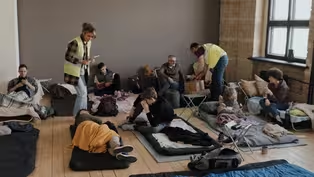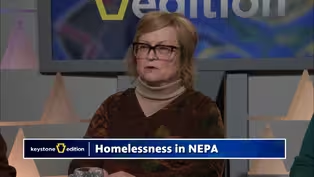Keystone Edition
Breaking the Barriers: Addressing Homelessness Through Housing and Social Change
Clip: 2/3/2025 | 10m 23sVideo has Closed Captions
Breaking the Barriers: Addressing Homelessness Through Housing and Social Change
Breaking the Barriers: Addressing Homelessness Through Housing and Social Change
Problems playing video? | Closed Captioning Feedback
Problems playing video? | Closed Captioning Feedback
Keystone Edition is a local public television program presented by WVIA
Keystone Edition
Breaking the Barriers: Addressing Homelessness Through Housing and Social Change
Clip: 2/3/2025 | 10m 23sVideo has Closed Captions
Breaking the Barriers: Addressing Homelessness Through Housing and Social Change
Problems playing video? | Closed Captioning Feedback
How to Watch Keystone Edition
Keystone Edition is available to stream on pbs.org and the free PBS App, available on iPhone, Apple TV, Android TV, Android smartphones, Amazon Fire TV, Amazon Fire Tablet, Roku, Samsung Smart TV, and Vizio.
Providing Support for PBS.org
Learn Moreabout PBS online sponsorshipSo what are some of the biggest barriers you're seeing people wanting housing, I know we talked about very, you know, high rent prices or a lack of affordable housing, what other barriers are you seeing?
I'll let either one of you take that.
- I think the social stigma.
We have this perception that homeless people are a certain drain on society, they're all drug addicts or alcoholics, they don't want recovery, they don't want to be part of society.
And as a consequence, we ignore them.
We walk right past them.
Or we think if we give them $5, they're just gonna go buy drugs or something.
And that's the biggest, to me, one of the biggest social stigmas.
Very often when people say unkind things about homeless people to me, I really would like to say to them, "Give me your wallet and give me your car keys.
Now go home."
- Yeah.
- Mm.
- And see how you get there.
See, you know, how tough it is to find a bus after 6:00 PM.
- Yes.
- You don't have any cash, you don't have your phone.
"Gimme your phone," right?
Who are you gonna call?
How are you gonna call?
And I think if people had to experience that, people who have resources had to experience that, they would hopefully- - That's interesting point.
- Become more aware of how tough it is to be without a support system.
- You were gonna, I heard you all over that one.
- Yeah.
It's dual, right?
It's the social aspect, right?
It's our society views individuals who are homeless as they have done something to get themselves there, and that's just not the case.
Maureen mentioned drug addiction.
There are more people housed that are addicted to substances than are unhoused.
That's just, that's known.
And there is, there's so much that...
The only thing that's gonna solve homelessness is more affordable housing, and we just don't have that.
We have a lack of incentive for landlords to participate in subsidized programmings, like Section 8.
We have a lack of incentives for developers to develop low-income housing or to apply for grants that will help them with supplies that don't cost a lot so they can develop in neighborhoods.
We criminalize individuals who need help, asking for help is shameful.
I think we need to focus on keeping people housed, because once someone is unhoused, studies show that once someone is unhoused, if you can't get them sheltered within three days, it now becomes a three-year issue.
And Maureen- - Say that one more time.
- If you, once someone becomes unsheltered, you have a three-day window to get them sheltered before it can become a three-year process.
- Wow!
- 10 years ago, homelessness was expected to be eradicated in 88 years.
I would assume at now that those numbers are higher, that it would be an infinite number of years that we can expect to eradicate homelessness if we don't do something now.
Maureen mentioned the bus passes infrastructure, a lack of infrastructure, lack of public transit.
A car-centric city is not gonna do well for individuals who need to get to work.
Centralizing all your industrial warehouses and employability in one location but not making that location accessible by bus or public transit is a problem, is a problem we see in this area very much.
- A lot of services for people in need are downtown, but we've lost a lot of downtown housing to higher-end development.
- Agree, yeah.
- And I don't, you know, judge them that people want to make money, and that's fine, but there's been no accommodation for those people who've lost their housing.
There's no place else to go.
You can't push them out to the suburbs because that kind of housing doesn't exist in the suburbs.
So that's why they sleep along the river or behind the grocery store, in some abandoned cars.
And that's, we have no means of compensating for that change in development.
- Those are wonderful ideas, all, but very big, expensive initiatives.
What would you love to see as a first step?
Where do you go from here?
- I think that we have to get away from top-down economics.
Charles Marohn wrote a really great book, "Strong Towns."
It talks about a bottom-up.
And it's incremental changes over time, it's getting your community involved.
Would we love to see beautiful new buildings in our area?
Of course, but with that comes, then you have to now focus on your water waste and how your water is being in your community, and then that's a cost for the city and the taxpayers.
So, massive and mega development is wonderful, but I think we're missing the mark in helping the underserved and the real community and the real heart of our community.
And you're only as good as the worst of your community.
So if your community is suffering, then your city is suffering, and you have to pay attention to that.
And I think that, I think it's possible.
I think small changes over time is possible.
I don't think it's this expansive, build a brand new shelter, spend millions of dollars, I think it's invest in your landlords, invest in affordable housing, incentivize those landlords to participate in subsidy programs, incentivize these landlords to assist, or more federal funding for utility assistance, keeping people in their homes.
We could talk about, you know, families that have to choose between their utilities and then their parenting, right?
Like, a parent can't focus on parenting if they have to choose between keeping their lights on and they have to work two jobs.
Now the parenting suffers, now the school numbers suffer, now the academics suffer.
And then any child, Maureen knows this as well, you know, children that are at risk of housing insecurity or facing housing insecurity or facing homelessness then grow up to also be at higher risk for homelessness and housing insecurity.
So it's this generational trauma and cycle.
And we haven't even talked about trauma and how that keeps people in the cycle of homelessness.
I'll be here all day.
(laughs) - I was just gonna say, 26 minutes is pretty tough to get into a topic as big as this, and of course there's no way we could, but we're trying to at least spawn some conversation elsewhere.
So I guess to you, Maureen, I would say, oh, you were gonna say something, you go ahead.
- Well, I was gonna say, because of the rising rents specifically with COVID, a lot of landlords came in from out of town, caught up a bunch of houses, and raised the rents.
We ended up buying our own apartment building because we were priced out of the market for our kids.
And now having our own building has been pretty good for us.
It's not a moneymaker, right?
We're not in it for the money, we're nonprofit.
And if I had the money from the government or the city or somebody, I would buy another building, absolutely.
And I would encourage public private partnerships where a developer has a property and maybe it's going slow or it's not what they want, you know, sell it to us for next to nothing (chuckles) and let us take it and run with the ball and make low-income housing.
- Get some creative ideas out there.
- Exactly, you don't have to build something brand new.
We can take the existing structures in the city and make them into reasonable housing.
We don't need marble countertops.
- No.
- We don't need pot fillers.
We don't need, (chuckles) you know, we don't need a balcony- - As someone who's seen that apartment.
- We don't need, yeah, exactly, yeah.
- It's incredible.
- Yeah, you're right, we don't need balconies, we need- - No.
- Plumbing, electricity, and enough bedrooms for the family to live like human beings and respect their dignity as human beings.
- And not have to worry about if they're going to eat or if they're going to have a place to stay.
Just be a parent, be there for their children, focus on academics, focus on, you know, instilling values into their child.
I think we do a real disservice when we look at parents and we- - Criticize.
- We criticize them for working but then also criticize them for being homeless.
(chuckles) So, I think we do a disjustice to the individuals that are in this area.
Most individuals in the United States are one emergency away from housing insecurity.
It is everybody, and I just want that to be very clear, that housing and security touches everyone.
- Yeah.
- Sarah, any parting thoughts here?
- Well, one of the things that I think is so interesting about the work that you all do is that there are so many ways in which we could help, things to tackle, so everything that you are doing, you're doing so much.
And I know you all feel like it's maybe just a drop in the bucket, but, you know, that seems to be the way that you work, right?
- Yeah.
- Person to person.
- Yeah, that's the only way we'll ever solve this, is it's not, well, this is amazing, right?
And it's gonna reach many people.
What's going to change the homelessness and the conversation is you going home and having a conversation with your husband, you going home and having a conversation with your husband, and they have a conversation with someone that says, this isn't just about someone who's drug-addicted, drunk, or junkie, this is your coworker, this is your neighbor, this is your sister's friend.
They're human beings, and they deserve to have safe places.
Housing should be a human right.
Housing is a human right, and the face of homelessness is us.
- Mm-hmm, mm-hmm.
- Well, Sarah, Maureen, Lasha, I appreciate your time and your wisdom.
Thank you for sharing all of that with us.
Homelessness in NEPA - Preview
Preview: 2/3/2025 | 30s | Watch Monday, February 3rd at 7pm on WVIA TV (30s)
Rising Homelessness and the Struggle for Affordable Housing
Clip: 2/3/2025 | 3m 46s | Homelessness is rising due to high living costs, as shelters struggle to provide support and housing (3m 46s)
Understanding Homelessness: A Systemic Challenge
Video has Closed Captions
Clip: 2/3/2025 | 9m 23s | Homelessness is systemic, underreported, and affects all. (9m 23s)
Providing Support for PBS.org
Learn Moreabout PBS online sponsorship
- News and Public Affairs

Top journalists deliver compelling original analysis of the hour's headlines.

- News and Public Affairs

FRONTLINE is investigative journalism that questions, explains and changes our world.












Support for PBS provided by:
Keystone Edition is a local public television program presented by WVIA


